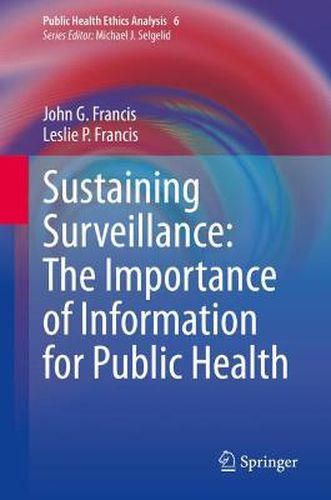Readings Newsletter
Become a Readings Member to make your shopping experience even easier.
Sign in or sign up for free!
You’re not far away from qualifying for FREE standard shipping within Australia
You’ve qualified for FREE standard shipping within Australia
The cart is loading…






This title is printed to order. This book may have been self-published. If so, we cannot guarantee the quality of the content. In the main most books will have gone through the editing process however some may not. We therefore suggest that you be aware of this before ordering this book. If in doubt check either the author or publisher’s details as we are unable to accept any returns unless they are faulty. Please contact us if you have any questions.
This book presents a comprehensive theory of the ethics and political philosophy of public health surveillance based on reciprocal obligations among surveillers, those under surveillance, and others potentially affected by surveillance practices. Public health surveillance aims to identify emerging health trends, population health trends, treatment efficacy, and methods of health promotion–all apparently laudatory goals. Nonetheless, as with anti-terrorism surveillance, public health surveillance raises complex questions about privacy, political liberty, and justice both of and in data use. Individuals and groups can be chilled in their personal lives, stigmatized or threatened, and used for the benefit of others when health information is wrongfully collected or used. Transparency and openness about data use, public involvement in decisions, and just distribution of the benefits of surveillance are core elements in the justification of surveillance practices. Understanding health surveillance practices, the concerns it raises, and how to respond to them is critical not only to ethical and trustworthy but also to publicly acceptable and ultimately sustainable surveillance practices. The book is of interest to scholars and practitioners of the ethics and politics of public health, bioethics, privacy and data technology, and health policy. These issues are ever more pressing in pandemic times, where misinformation can travel quickly and suspicions about disease spread, treatment efficacy, and vaccine safety can have devastating public health effects.
$9.00 standard shipping within Australia
FREE standard shipping within Australia for orders over $100.00
Express & International shipping calculated at checkout
This title is printed to order. This book may have been self-published. If so, we cannot guarantee the quality of the content. In the main most books will have gone through the editing process however some may not. We therefore suggest that you be aware of this before ordering this book. If in doubt check either the author or publisher’s details as we are unable to accept any returns unless they are faulty. Please contact us if you have any questions.
This book presents a comprehensive theory of the ethics and political philosophy of public health surveillance based on reciprocal obligations among surveillers, those under surveillance, and others potentially affected by surveillance practices. Public health surveillance aims to identify emerging health trends, population health trends, treatment efficacy, and methods of health promotion–all apparently laudatory goals. Nonetheless, as with anti-terrorism surveillance, public health surveillance raises complex questions about privacy, political liberty, and justice both of and in data use. Individuals and groups can be chilled in their personal lives, stigmatized or threatened, and used for the benefit of others when health information is wrongfully collected or used. Transparency and openness about data use, public involvement in decisions, and just distribution of the benefits of surveillance are core elements in the justification of surveillance practices. Understanding health surveillance practices, the concerns it raises, and how to respond to them is critical not only to ethical and trustworthy but also to publicly acceptable and ultimately sustainable surveillance practices. The book is of interest to scholars and practitioners of the ethics and politics of public health, bioethics, privacy and data technology, and health policy. These issues are ever more pressing in pandemic times, where misinformation can travel quickly and suspicions about disease spread, treatment efficacy, and vaccine safety can have devastating public health effects.